Similarly, there are options in defence. Each player will have special abilities (yes, perks) to deploy during a chase – like the ability to temporarily morph into a different character, send a decoy in the opposite direction, or deploy a smoke bomb. It’s obvious, even from the early build, that the balance between attack and defence is spot on – you get points for both kills and escapes. It gives us hope that the multiplayer will deliver long after aspiring Ezios have given up on the main story. Speaking of which…
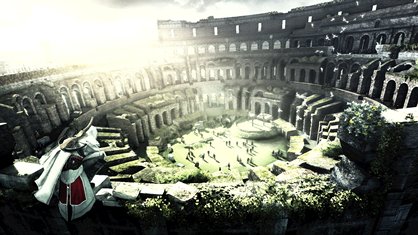
On the surface Brotherhood’s solo campaign seems to be a similar experience to Assassin’s Creed II. You still play as Ezio, you’re still in renaissance Italy (albeit Rome this time) and you’re still the deadliest thing in Europe since the Black Death. It’s the age-old argument that, if the basic gameplay and themes work (and people want more of them) there’s no need to make needless changes.
However, this isn’t to say Brotherhood lacks innovation or variety. The core mechanics (with the exception of the weapon combat, which is being overhauled) may stay similar but it will be considerably fleshed out, its scope expanded. In terms of single-player, the big innovation is the ‘brotherhood’ part of the title. Following a lifetime of fighting the Templars, lead by rival family the Borgias, Ezio turns his attention to the heart of European power: Rome.
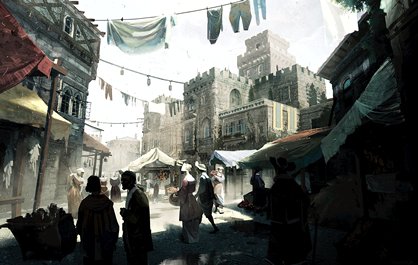
It’s too vast a city to tackle on his own, so our hero sets up an Assassin’s Guild with the aim of recruiting and training an army of followers. You’ll go through this process at the beginning of the game, and will be able to micromanage both your Guild HQ and your followers, overseeing their training and sending them off on contract-killing missions throughout Europe.
In fact, the ownership element of the game is vastly expanded. Now you can buy swaths of Rome, gentrifying districts as you pump money into them through banking, shops and other guilds. We’re assuming certain properties will grant mid-mission perks (safehouses and the like) but this is still unconfirmed. The more property you own, the bigger your income – just like the Monteriggioni villa in ACII – but in addition to that, your Assassin’s Guild provides extra benefits that help you out on the streets. On a basic level, it's squad commands.
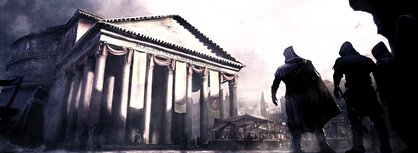
As Ezio, you have an entourage of deadly followers hidden from sight, just waiting to do your bidding. Give a signal, and a chosen man will leap from cover to off the foe of your choice. Alternatively, you can order your men to silently take down bodyguards, leaving your target wide open for attack. Understandably, Ubisoft is keeping story details under wraps. Machiavelli and Leonardo (plus his flying machine) return, Secret Tombs are back – there’s one under the Coliseum – and countryside horse sections are gone, replaced by the ability to bring your nag into the city and involve it in your free-running and assassinations.
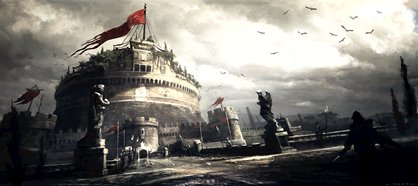
In keeping with the ethos that made AC IIsuch a great sequel, the devs are again listening to fans, removing stuff they don’t like and tweaking moments of sloppiness. It’s a formula that worked last time, and from this early snapshot of Brotherhood, it seems to be working again. Familiar? Yes. Any less exciting? Hell no.
Sign up to the GamesRadar+ Newsletter
Weekly digests, tales from the communities you love, and more
An interview with AC Brotherhood’s Producer Vincent Pontbriand and Lead Designer Patrick Plourde.
Are we just playing as Ezio, or are we playing as Desmond playing as Ezio in Brotherhood?
Vincent Pontbriand: We are continuing the story of Lucy and Desmond and other present-day assassins. That’s important for the franchise. It’s actually our core DNA and it’s our overarching storyline, so we are pushing the story ahead and you learn more about the relationship between these characters and their ultimate goal, which is defeating the present-day Templars. The narrative will have a few twists.
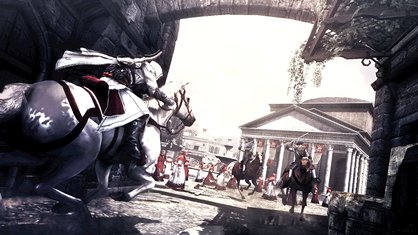
Would you describe it as Assassin’s Creed III?
VP: We could have put that number on the game. It has the scope. To develop our brand we like to keep our numbers for new settings, new characters. So eventually, when it’s on the moon, you’ll have your ‘3’, no problem [Laughs]. We like to say it’s like a new season on a TV show. We establish characters, setting etc. so we can have that behind us and create a new storyline. It’s not a new setting but it’s a new playground, a new city. We’ve built an entire city from the 16th century to have fun in.
Are you concerned people might get Renaissance Italy fatigue?
VP: We considered all that, but we did our market research and people want more, and more than a DLC pack. People want to know what happens next. Rome is a little less Renaissance than Florence. Florence hasn’t changed much in 500 years. Rome at the time was just beginning to enter its period of Renaissance. We’re taking that fact and playing with history a bit. But it’s still a rich period. Between 1500 and 1527 Rome was paradoxically both entering its Renaissance but was also in the grip of the decadent Borgia family. Then the French army invaded…


